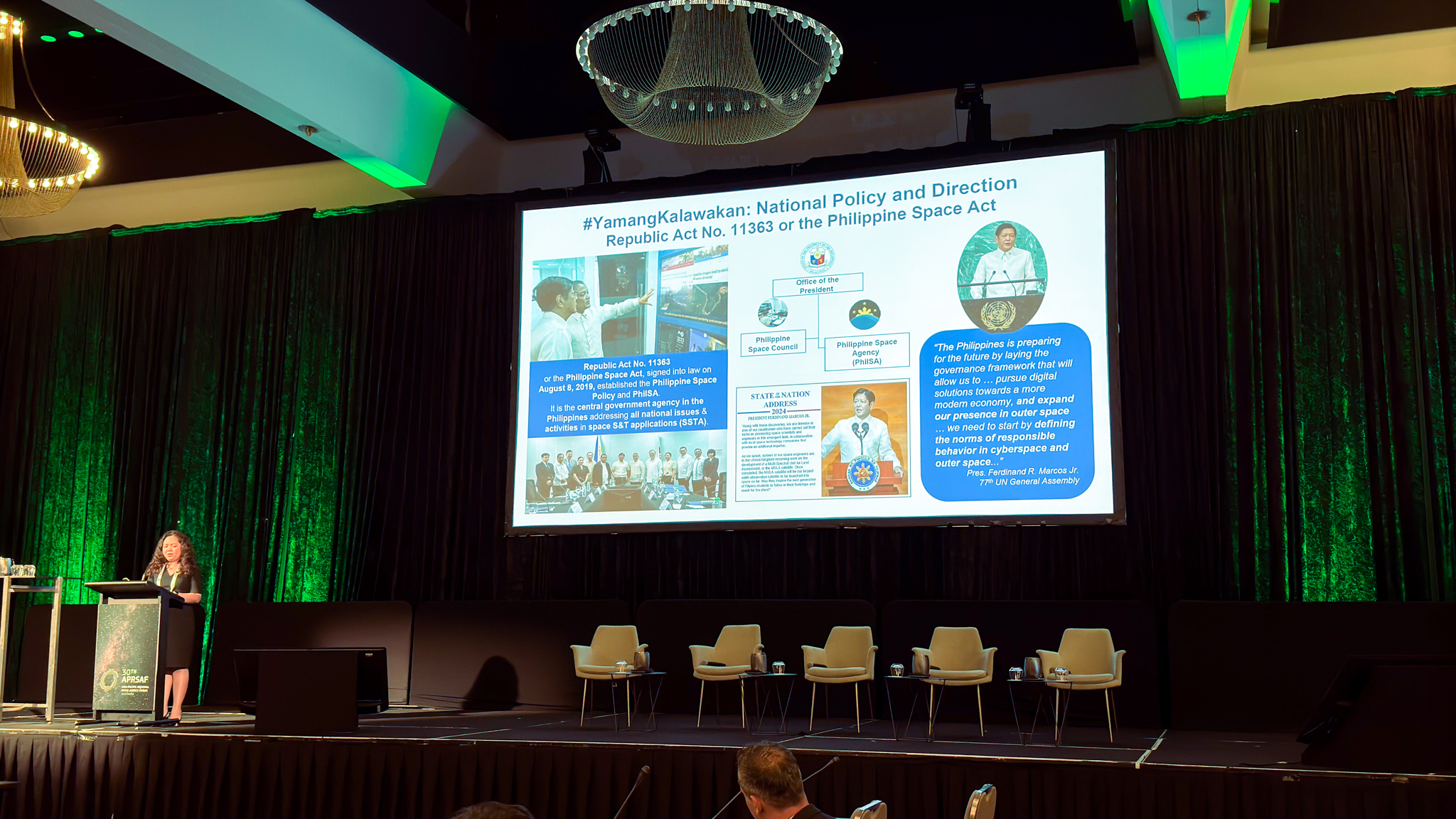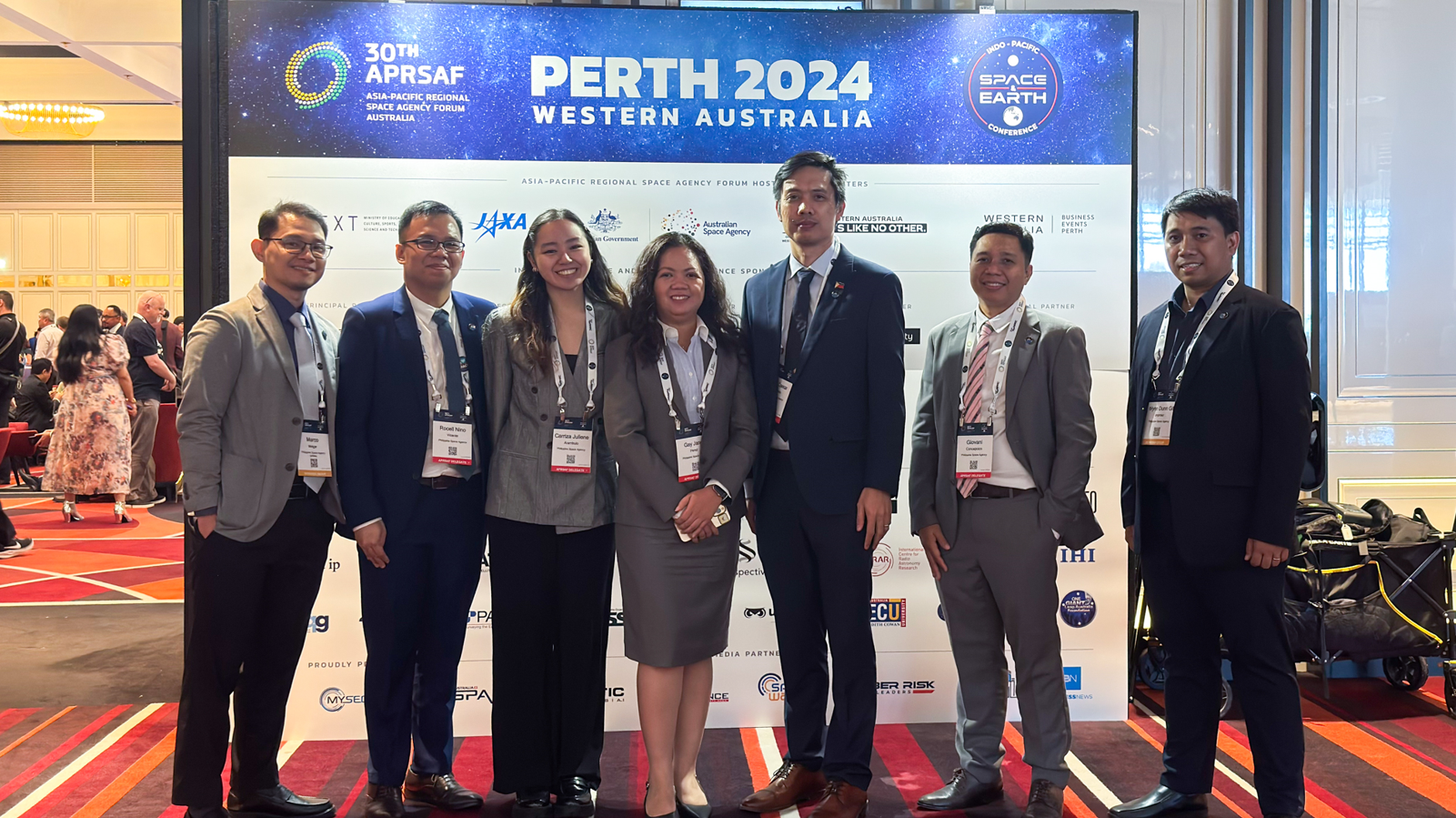The Philippine Space Agency (PhilSA) participated in the 30th session of the Asia-Pacific Regional Space Agency Forum (APRSAF-30) in Perth, Australia from 26 to 29 November 2024.
The annual space forum, hosted this year by Australia through the Australian Space Agency and jointly organized with the Government of Japan via the Japan Aerospace Exploration Agency (JAXA) and the Ministry of Education, Culture, Sports, Science and Technology (MEXT), brought together space agencies, government entities, private companies, industry leaders, international and regional organizations, academia, and individuals from across the Asia-Pacific region.
PhilSA’s participation in APRSAF-30 aligns with the forum’s theme of “Collaborating to Build a Sustainable and Responsible Regional Space Sector.”
Dr. Gay Jane P. Perez, Deputy Director General for Space Science and Technology, represented PhilSA at the Plenary, where she delivered a report on the country’s space activities and participated in the Asia-Pacific Space Leaders Roundtable.
In her presentation, Dr. Perez said, “Collaboration comes with challenges and opportunities. Strengthening people-to-people ties, enabling data sharing, and building capacity across institutions remain vital components of our efforts. Through APRSAF, we can work together to promote space-enabled action, ensuring that the information gathered from space translates into tangible socio-economic benefits.”

Dr. Gay Jane P. Perez, PhilSA Deputy Director General for Space Science and Technology, delivers the Philippines’ space activities report
Participation of PhilSA in Working Groups
PhilSA joined five (5) working groups and two (2) closed sessions of the APRSAF to share the country’s initiatives on space applications, space technology capability, space exploration, space education, and space policy and law.
The Satellite Applications for Societal Benefit Working Group (SAWG) aims to promote and facilitate the use of space-based systems, including Earth observation satellites and navigation satellites combined with ground-based information, to address a broad range of common social issues in the region and to support global agendas such as the Sustainable Development Goals (SDG). It also aims to establish and strengthen the cooperative framework between space agencies and stakeholders, including end-users and development aid agencies, in a sustainable way. In this working group, Dr. Ariel C. Blanco, Director of the Space Information Infrastructure Bureau (SIIB), presented virtually on “Advancing Coastal Marine Environmental Information with Hyperspectral Satellite Imagery: Case Studies in the Philippines” at the Space Applications Session. Ms. Cara Patricia Canlas also delivered an online presentation on “Defining Fire Regime in Palawan, Philippines using Satellite-based Fire Products” at the Sentinel-Asia Session.
The Space Capability Working Group (SCWG) provides opportunities for information sharing and personnel interchange to promote a sustainable and responsible regional space sector, in addition to improving space technology capabilities to help solve social issues in this region. For this working group, Dr. Marc Caesar Talampas, Director of the Space Technology Missions Systems Bureau (STMSB), participated in the session that tackled best practices in space applications and space technology from a systems engineering and project management perspective.
The Space Policy and Law Working Group (SPLWG) aims to enhance the capacity in space policy and law of each country, acknowledging that space technology and space policy and law form an inseparable pair in the context of space related activities. Mr. Kritzman Caballero, Space International Cooperation Division (SICD) chief, delivered an online presentation on PhilSA’s contributions to the National Space Legislation Initiative (NSLI) – 3rd Phase.
The SPLWG and SCWG also held a joint session in which participants shared information about their efforts in implementing the “Long-term Sustainability Guidelines for Outer Space Activities” from a wide range of perspectives. In this joint session, Dr. Talampas and Atty. Concepcion gave their views from the technical and policy/legal perspectives, respectively.
PhilSA was represented by Mr. Wynn Dunn Gil D. Improso at the Space Frontier Working Group (SFWG), where he presented the country report on its International Space Station (ISS) utilization activities. SFWG aims to explore new space frontiers and raise awareness of international space utilization and exploration activities. This working group discusses the utilization of the Japanese Experiment Module “Kibo” of the ISS for scientific experiments and technology demonstrations, and discusses topics related to space exploration beyond the ISS and Low Earth Orbit (LEO).
Developing space education and awareness in the Philippines was a feature in PhilSA’s presentation at the Space Education for All Working Group (SE4AWG). Marco D. Melgar of the Space Education and Scholarships Division presented on the Agency’s scholarships, training and capacity building activities, and advocacy programs at the working group’s Regional Space Education Congress session. SEA4WG tackles space education activities, training programs, exchange of information and best practices, and opportunities for capacity-building and collaborations among participants.
Asia-Pacific and Beyond
In its 30th year, APRSAF has made significant progress in discussing sustainable and responsible space practices, advancing regional initiatives, delivering technical working group activities, workshops, and plenary sessions, while engaging in lively discussions on new activities and further opportunities to collaborate.
“APRSAF recognizes the importance of activities aimed at solving common regional issues related to disasters, climate and environmental change, as well as contributing to solving global issues such as the SDGs, through the integrated use of earth observation and positioning satellites, and ground observation data. Importantly, APRSAF-30 provided an opportunity for a focused exchange of information and ideas on the use of satellite applications for the benefit of the entire Asia Pacific region, especially countries that don’t have own space agencies, like the smaller Pacific Island countries.” The joint statement of this year’s organizers stated.
The 31st Annual Meeting (APRSAF-31) will be held on 18-21 November 2025 in Cebu, Philippines.




